
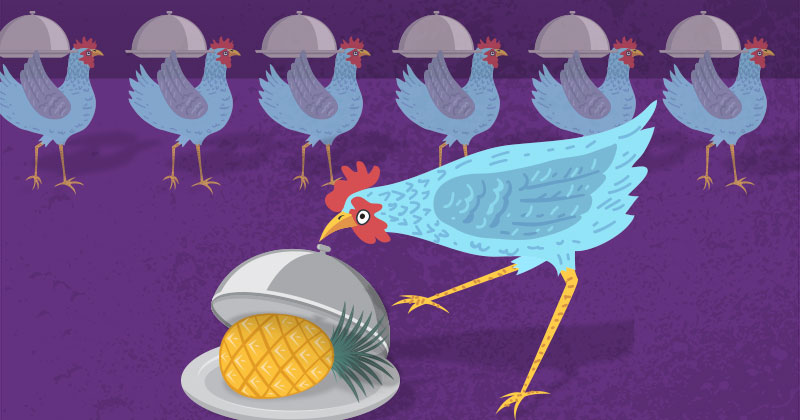

Rewriting the hospitality handbook
Service... the Blue Hen way
April 14, 2023
Oceanside, mountainside and everywhere in between, from burrito joints to private jets, Blue Hens are reimaging the rules of the service industry. Here are their unspoken bylaws of the bar, mores of the motel and edicts of the eatery—no tipping required.
BE SOMEONE’S ELF: At the Ritz-Carlton Bacara hotel in Santa Barbara, California, set on 78 picturesque acres overlooking the Pacific, guest services manager Danielle Schwartz, BE21, has catered to Stevie Nicks, Olivia Rodrigo and Lorde. But one of her most memorable experiences is tied to an 8 year old who checked in with his parents in December 2021. Since the boy’s father needed surgery nearby, the Colorado-based family prepared for a cheer-free holiday spent between hospital and hotel. Schwartz upgraded them to a suite and, while they were out on Christmas Eve, she transformed the space into a winter wonderland, complete with tree, twinkling lights, gingerbread cookies, hot chocolate station, ornament decorating area and, naturally, presents. For the rest of his stay, the little boy lit up like one of the hotel’s sparkling chandeliers, reaffirming for Schwartz the value of going above and beyond: “Lifting someone’s spirits is a natural high.”
FEEL FREE: Fifteen years ago, Paul Altero opened his first Bubbakoo’s Burritos shop with nothing but a home-equity loan, a credit card and a dream. Since then, the Blue Hen has survived 20-hour days, a devastating Jersey Shore hurricane, even that infamous afternoon when he ran out of tacos on $1 taco day. But it wasn’t until the onset of the COVID-19 pandemic that the embattled restaurateur thought: “We might actually sink.” So Altero, BE96, did something counterintuitive. For anyone who’d lost a job, couldn’t afford to eat or just needed a break, he advertised free food—no questions asked. If he was going down, he figured, he’d do some good along the way. But hundreds of pro-bono burritos helped keep Altero afloat, engendering loyalty from an increasingly fanatic customer base. Today, the now-franchised company is launching its 82nd location, with 130 more in development across the nation, proving that a give-back mentality helps fuel growth. “We didn’t do this for a return on investment,” Altero says. “But people truly appreciate community engagement.”
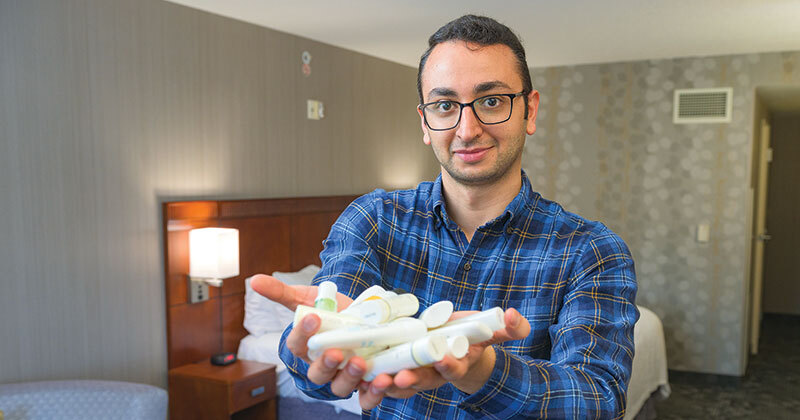
LET THE SHAMPOO GO: In the Markazi province of Iran, known for its pomegranate trees and hot springs, Farhad Tabatabaei, BE25, worked as a receptionist for a 52-room hotel that cared more about its bottom line than its customers. If a manager suspected guests of taking a towel—or even just a bottle of shampoo—he seized and searched their bags in the middle of the lobby “like an airport security guard,” Tabatabaei says. “It was insane.” The receptionist felt so much secondhand embarrassment, he pleaded with his supervisors to end this policy, even offering to pay for the contraband toiletries himself. But when these cries fell on deaf ears, Tabatabaei quit. Now a Blue Hen working toward his Ph.D. in hospitality management, he has never regretted his decision. In hospitality, he says, aligning with a company that shares your values is “the most important thing.”
REPURPORSE YOUR EGGS: A little-known side effect of COVID-19: a surplus of ostrich eggs. At least this was the case at Walt Disney World’s Animal Kingdom Lodge, where eggs laid by a resident herd are typically sculpted into fantastical shapes by so-called cultural representatives from Africa. But, during the pandemic, these employees were stuck overseas, and the shells piled up. As a member of the resort activities team, Brian Wherry, AS20, got creative. He and his colleagues organized egg-painting and ornament-making sessions for guests at Easter and Christmas, respectively. They even oiled up some of the three-pound orbs for swimmers to discover at the bottom of the resort pool (attempting to pick one up underwater makes for a silly game), and they made others into “hidden Mickeys” placed around the park for guests and employees to find. Even at Disney, Wherry says, there’s nothing abra cadabra about it: “If you want to make hospitality magic, get resourceful.”
WRITE THE SCREENPLAY: Sheryl Kline accidentally worked for the mob. In her 20s, she moved from New Jersey to Las Vegas and made her way from intern to manager at the Stardust Resort and Casino, the inspiration behind the 1995 Robert De Niro film Casino. She figured out the mafia connection only when FBI agents stormed the place due to an elaborate skimming operation happening on the gaming side of the business. (Kline worked on the hotel side, blissfully unaware of her employer’s shadier dealings.) For this hospitality professional turned UD professor, the raid represented just another day at the office—like that time she witnessed three thieves in nylon masks rob that same workplace at gunpoint in broad daylight. They successfully pilfered the casino’s cage area for cash before fleeing to the Strip, where a police chase ensued. When you work in this industry, wild stories abound. Kline advises: “Keep a diary.”
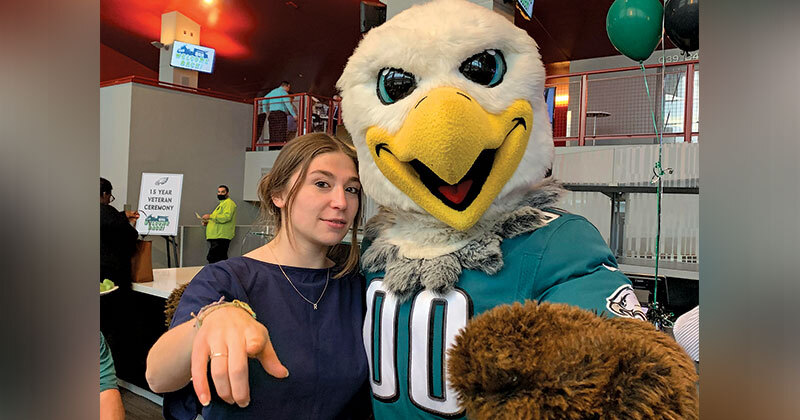
GET A HYPE SONG: Regina Donato loves the Philadelphia Eagles. Unfazed by inebriated fans fistfighting in body paint or pouring beer on Cowboys supporters, she knows the rewards of her job as a game day staffer—from leading hundreds of spectators in the fight song to helping disabled guests navigate Lincoln Financial Field—are worth the challenges. “The fans are intense,” says Donato, AS21, who also serves as program and communications manager for the Delaware State Chamber of Commerce. “But if you embrace all that passion, you become part of a family.” To get herself pumped up for kickoff, she listens to an energizing playlist during her 30-minute commute that includes, naturally, “Eye of the Tiger.” In this line of work, she says, bringing your game face “makes all the difference.”
HITCH A RIDE: You don’t say no to the president of the United States. So when Joe Biden’s people regularly need vehicles for their motorcade, Ryan Shaer hustles. Problem is, the Philadelphia based company where the Blue Hen serves as vice president, Ace Limousine and Airport Service, is often booked solid by the time the White House comes calling—they regularly transport brides, executives, ComicCon talent, even Gritty, googly-eyed mascot of the Philadelphia Flyers. When there’s no vehicle left for the press corp or Secret Service, Shaer, BE16, has stayed up until the wee hours, making urgent calls to as many as 20 competitors until he finds one with a spare car or two. In moments like these, he feels gratitude for all the time he’s spent building collaborative relationships in the industry, mentoring at networking events and generally being a good neighbor every chance he gets. “I’ve learned that if you help everyone around you, they help you back,” he says. “What you give comes full circle.”
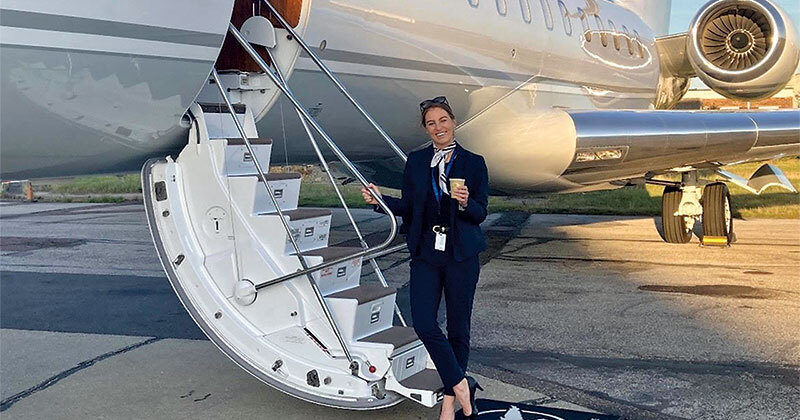
PREPARE FOR TAKEOFF: Last summer, Kailyn O’Brien flew from New York to Nigeria for the extradition of a Colombian drug trafficker. Aboard an elegant Global 6000 chartered jet, the corporate flight attendant catered to FBI agents as well as the prisoner, who alternated between watching a movie on an iPad and sobbing as he looked out the window. This was not a regular flight for O’Brien, BE16, whose typical workday involves serving caviar to billionaires and A-list celebrities on private planes lined with marble and spritzed with Chanel perfume—Serena Williams, Carrie Underwood and Dwayne “The Rock” Johnson all make the Blue Hen’s nice list. But one of the greatest takeaways from her time spent cruising at 40,000 feet is the importance of treating all clients—whether their faces appear on magazines or mugshots—with the same respect. After all, we have more in common than meets the eye. Wayne Gretzky? Afraid of flying. Christina Aguilera? Loves junk food from Wendy’s. “I’ve learned that money isn’t everything and it can’t buy you happiness,” O’Brien says. “We’re all human, we all struggle. Being a good person is what I’m after.”
DRINK THE SNAKE BLOOD: Before becoming a vice president with the multi-billion ARAMARK corporation (more on this on page TK), Allan Fernandes, EOE92, did consulting work in Asia. Once, clients in China took him to a restaurant where snake-filled cages lined the walls. A waiter presented one of the live, 12-foot serpents to him for approval the way a U.S. server might present a bottle of cabernet. “I didn’t know how to evaluate snakes,” Fernandes says now. “So I just told them: ‘Yes, looks good’.” A chef then transformed the reptile into a multi-course spread, from soup to fried meat. The showpiece? A cup of snake blood which Fernandes graciously drank, cringing only on the inside. “It was terrible!” he says, adding that the warm elixir had, naturally, “a bite.” But despite the somewhat metallic aftertaste, the hospitality professional is happy to have sampled the ophidian nightcap. Respecting the customs of others is key to success in business, he’s learned, but also in life. “Some of my most enriching moments have come from immersing myself in local cultures,” he says. “Experiences are what life is all about.”
TEE UP THE BABY: When the ultrasound tech told Allie Waldman her due date, the mom-to-be shook her head. “No, that won’t work,” she said. “I’ll be busy that week.” As assistant clubhouse manager at Georgia’s Augusta National, arguably the most prestigious golf club in the world, Waldman, BE14, plays a crucial role in planning and executing the sport’s annual Masters Tournament. During the weeklong professional championship, more than 400 employees—from restroom attendants to member chauffeurs—rely on her to troubleshoot 11th-hour crises. So, in 2020, Waldman made sure to plan the arrival of her first baby for November—a full seven months after the April tournament. But then COVID-19 postponed that tournament for, you guessed it, seven months. The stakes already felt sky-high for the Blue Hen, the first woman to hold her position, so a scheduling hiccup should have intensified the pressure. But even while fielding urgent phone calls during labor, Waldman felt a sense of calm, comforted by the relationships she’d built with her team on the ground. “Mutual trust doesn’t come overnight or even a year,” she says. “It comes from showing up for each other, consistently, every day. Do that, and you can get through anything.”
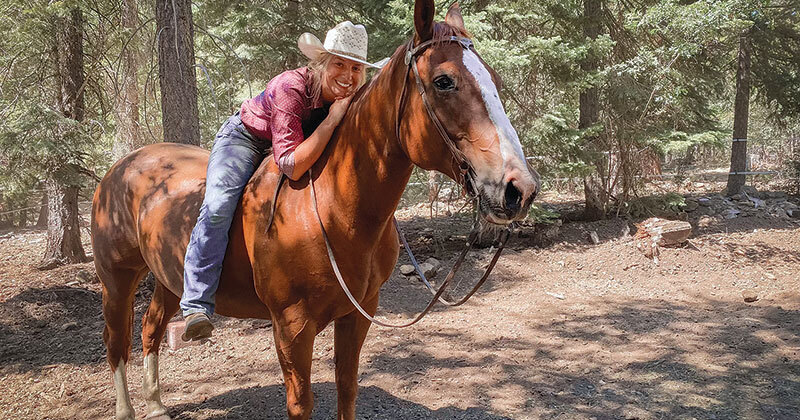
GET BACK IN THE SADDLE: At the north end of Washington’s San Juan Island, where orca whales practice their backflips, Melissa Kay works as a dockhand for the world-class Roche Harbor Resort Marina. On a typical day, she greets seafarers from around the world and helps secure around 30 vessels—from briny fishing boats to 150-foot yachts. Frequently, things go sideways—a client’s engine falters so that he’s spinning out in the harbor, or 60 mile-per-hour winds snap the lines of a multi-million dollar hull. But Kay, BE21, has experience keeping cool in emergencies. Before her time on the docks, she worked as a wrangler for a northern California dude ranch, where she taught vacationers to gallop through the Sierra Nevada Mountains. Once, on a ride with eight beginners, the group accidentally disturbed a beehive, scattering her horses through the woods. And, when encroaching wildfires threatened the ranch, Kay helped evacuate a herd of 60 to a pasture located an hour and a half away in Reno, Nevada—it required six trips in two days and plenty of deep breathing. “In this industry, things will go awry,” she says. “All you can do is remain calm.”
CALL THE NEIGHBORS: In January 2021, residents of Norwalk, Connecticut, found themselves snowed in, meaning customers couldn’t get to the city’s acclaimed Barcelona Wine Bar. But manager Logan Walsh, ANR20, who lived in an apartment building just above the Spanish tapas restaurant, showed up for work. He set up a boozy hot chocolate station on the bar and invited his upstairs neighbors to ride out the storm. The group sipped wine, helped make a pot of paella, workshopped potential new dishes and simply hung out for hours. “In this day and age, especially since the onset of the pandemic, we owe so much to our regulars,” Walsh says. “You have to be there for the people who’ve been there for you.”
Contact Us
Have a UDaily story idea?
Contact us at ocm@udel.edu
Members of the press
Contact us at 302-831-NEWS or visit the Media Relations website


